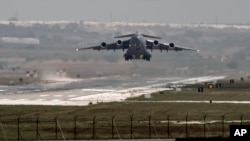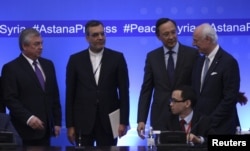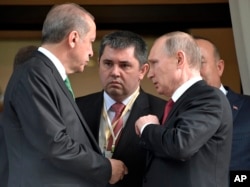A deal to establish “de-escalation” zones in Syria went into effect at midnight Friday (2100 UTC). Russia says the zones are now closed to aircraft from the U.S.-led coalition.
U.S. Defense Department spokesman Major Adrian Rankine-Galloway told VOA on Friday that "we certainly welcome any effort, any international effort to reduce the violence, to allow humanitarian assistance to reach those areas of Syria that need them, and ultimately a political resolution to the ongoing crisis there."
He continued with a warning: "I should point out that there will be no sanctuary for ISIS." He said the work "with partnered forces on the ground to defeat ISIS and to reclaim their so-called capitals in Iraq and Syria will continue unabated."
Alexander Lavrentyev, Russia's envoy to the peace talks in Kazakhstan, said Friday in remarks covered by Russian media that "the operation of aviation in the de-escalation zones, especially of the forces of the international coalition, is absolutely not envisaged, either with notification or without," he said. "This question is closed."
Russia, Turkey and Iran agreed to a Moscow-proposed deal Thursday to establish the so-called “de-escalation” zones in Syria to try to end the six-year conflict.
Representatives of the three Syria cease-fire guarantor nations signed a memorandum to that effect at the end of the latest round of peace talks in Astana, the capital of Kazakhstan.
The proposal calls for taking measures to reduce fighting in four designated areas of Syria where rebels not associated with Islamic State terrorists control significant territory.
Progress on peace?
Despite what appears to be progress after four rounds of talks in Astana, there remains a great deal of skepticism about whether such a deal can be implemented.
No details were released on how the three countries, which support different sides in the conflict, would attempt to end the violence. And while the Syrian government voiced its support for the agreement, neither Damascus nor the Syrian rebels signed any deal.
Members of the Syrian opposition delegation in Astana walked out of the meeting Thursday shouting their dissatisfaction with Iran being part of the talks. The head of the opposition delegation, Mohammed Alloush, did not attend the second day of talks.
The rebel delegation suspended its participation Wednesday over ongoing airstrikes, but members returned to the table for the final day of talks.
While Russia and Iran support the government of Syrian President Bashar al-Assad, Turkey backs the rebels.
Turkey - Russia agree on Syria
But during Turkish President Recep Tayyip Erdogan’s joint news briefing with Russian President Vladimir Putin in Sochi Wednesday, Erdogan concentrated on condemning terrorism rather than Assad’s government.
Despite an earlier fallout over Syria, Putin declared a returning to normal cooperation with Turkey and expressed confidence they could set up “de-escalation” zones.
But analysts say there is much yet to be negotiated on Syria and remaining differences between Turkey and Russia.
The United States and some Arab countries back rebel groups that want to overthrow Assad. The U.S. sent its highest level official yet to observe the talks in Astana - Acting Assistant Secretary of State Stuart Jones.
The Kremlin’s plan is similar to calls by U.S. President Donald Trump for “safe zones” in Syria, and Putin said Trump seemed to support the idea when the leaders talked Tuesday by phone.
More details, concerns and objections are expected to be aired in the coming weeks.
Kazakhstan’s Foreign Ministry said the next round of expanded Syria talks in Geneva is set for late May while the next Russia, Turkey and Iran-brokered Astana meeting is set for mid-July.



